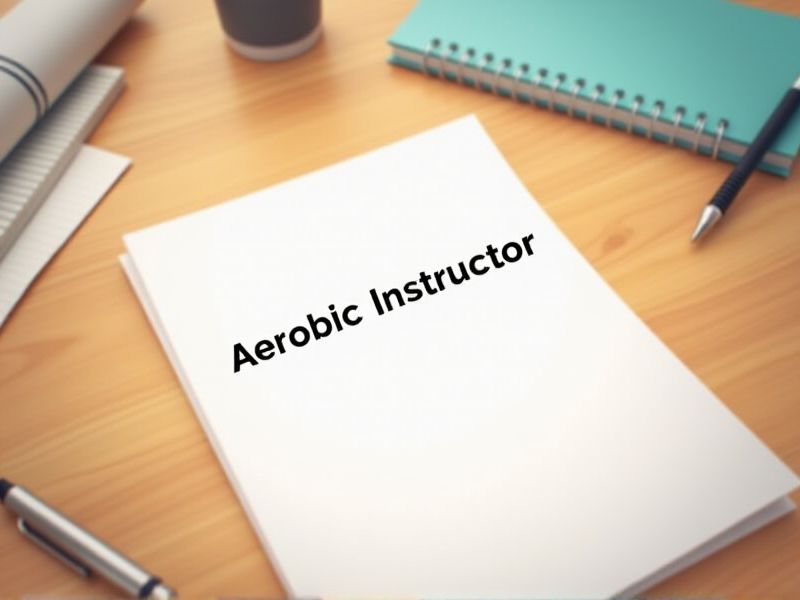
Aerobic instructors require specific certifications to ensure they possess the necessary knowledge and skills to lead safe and effective workout sessions. Certification validates their understanding of exercise physiology, safety protocols, and proper workout design, which directly impacts participants' health and fitness outcomes. Without standardized qualifications, instructional quality and participant safety could be compromised. Some essential certifications you may need for becoming an aerobic instructor include the following.
Aerobic Instructor Certification
Earning an Aerobic Instructor Certification ensures that an instructor possesses the necessary knowledge and skills to lead safe and effective workouts. Certification provides a standard of credibility and professionalism within the fitness industry, attracting more clients. Certified instructors are more likely to stay updated with the latest fitness trends and safety protocols, reducing the risk of injury to participants. Many gyms and fitness centers require certification as a baseline for employment, ensuring a consistent quality of instruction.
Group Fitness Instructor Certification
Group Fitness Instructor Certification equips instructors with essential knowledge of exercise science, which directly impacts the effectiveness and safety of aerobic classes. This certification ensures that instructors are trained to recognize and address various fitness levels and needs within a group setting, enhancing participant satisfaction. Certified instructors are better prepared to design structured and varied workouts, maintaining engagement and motivation among class participants. Insurance providers often require certification for liability coverage, affecting the instructor's ability to work in professional settings.
CPR/AED Certification
Having CPR/AED certification ensures an aerobic instructor is prepared to respond to cardiac emergencies during classes. High-intensity exercises can sometimes lead to unexpected health events, making immediate intervention crucial. CPR/AED skills increase the likelihood of survival for individuals experiencing cardiac arrest. Certification demonstrates a commitment to safety and professionalism, building trust with participants.
Anatomy & Physiology Certification
Holding an Anatomy & Physiology Certification equips an aerobic instructor with a comprehensive understanding of how the body functions during exercise, allowing them to design safe and effective workouts. Mastery of this knowledge reduces the risk of injury for participants, as instructors can tailor activities to accommodate various fitness levels and health conditions. Certification also enables instructors to recognize early signs of stress or fatigue in participants, promoting a safer environment. This specialized knowledge often enhances an instructor's credibility and employability within the fitness industry.
Personal Trainer Certification
A personal trainer certification ensures that an aerobic instructor has a structured understanding of exercise science, which is crucial for safely guiding clients. It provides credibility, helping instructors gain the trust of clients who seek knowledgeable professionals to improve their fitness. Certification often includes training on injury prevention, crucial in aerobic workouts that involve high-impact movements. Keeping up with certification requirements ensures instructors stay updated with the latest fitness trends and research, enhancing the quality of their instruction.
High-Intensity Interval Training (HIIT) Certification
Gaining a High-Intensity Interval Training (HIIT) certification equips an aerobic instructor with specialized knowledge in crafting effective workout programs that maximize cardiovascular and metabolic benefits. With the HIIT certification, instructors can tailor workouts to safely challenge different fitness levels, fostering enhanced participant satisfaction and retention. Certification ensures the instructor is up-to-date with current exercise science, minimizing the risk of injury while maximizing efficiency in training sessions. An instructor with a HIIT certification often gains credibility and trust, attracting more clients seeking scientifically-backed and result-oriented workouts.
Zumba Instructor Certification
Obtaining a Zumba Instructor Certification equips aerobic instructors with specialized knowledge in dance-based fitness routines, enhancing their skill set. This certification ensures instructors possess structured teaching methodologies specific to Zumba's energetic style, boosting class effectiveness. Clients often seek certified instructors for credibility and assurance of quality, increasing demand for experienced individuals. Certification courses provide networking opportunities with industry professionals, enabling instructors to stay updated on the latest Zumba trends and safety protocols.
Pilates Instructor Certification
Having a Pilates Instructor Certification ensures an understanding of biomechanics and muscle engagement, which complements aerobic training principles. It enhances an instructor's versatility in fitness knowledge, offering a wider range of exercise modifications to suit varying client needs. The certification also provides insights into core stabilization techniques that are beneficial in designing safe and effective aerobic classes. Market demand indicates that instructors with multi-disciplinary skills, such as Pilates and aerobics, often attract more clients seeking comprehensive workout regimens.
Yoga Instructor Certification
Yoga instructor certification provides aerobic instructors with a comprehensive understanding of body mechanics and alignment, leading to safer class instruction. Acquiring this certification equips aerobic instructors with stress-reducing techniques that can enhance overall fitness routines. Knowledge of yoga widens an instructor's skill set, increasing their marketability in the fitness industry. Yoga certification encourages a holistic approach to fitness, fostering an environment that focuses on both physical and mental well-being.
Strength and Conditioning Certification
Aerobic instructors benefit from a Strength and Conditioning Certification as it deepens their understanding of biomechanics and enhances the effectiveness of workout design. This certification equips them to prevent injuries by incorporating balanced strength exercises alongside aerobic routines. Having this credential increases an instructor's credibility and can expand career opportunities within fitness facilities. It also enables instructors to cater to clients seeking comprehensive fitness approaches, blending cardiovascular health with strength development.
Summary
As an aerobic instructor, obtaining certifications can significantly enhance your credibility and marketability in the fitness industry. Certified instructors are often perceived as more knowledgeable and experienced, leading to increased client trust and engagement. This recognition can result in more job opportunities and potentially higher income as studios and gyms may prioritize hiring certified professionals. Certification also provides updated knowledge, allowing you to deliver more effective and varied workout routines to your clients.
